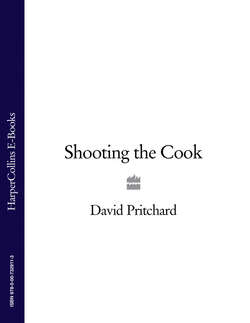Читать книгу Shooting the Cook - David Pritchard - Страница 15
Over here, Clive
ОглавлениеOn our return from France something happened in Bridport that changed things for ever. It was here that Floyd found the person he really wanted to be on television; the persona that the technicians at Plymouth had pronounced crap, and that John Purdie had predicted was destined for stardom.
During the morning we’d been filming the scallop boats returning to the narrow harbour at West Bay. Nowadays this part of the Dorset coast is famous for its hand-dived scallops. Divers wearing aqualungs scour the seabed looking for scallops of the right size. It’s a great way to preserve the stock; as with line-caught fish you take what you need and leave the rest for another day. All those years ago this method of fishing was just starting in Lyme Bay, but most of the local scallop fishermen still used small trawlers to dredge for them. Someone said it was a bit like using a tractor to weed an ornamental flowerbed. The trawler scooped up everything that came before it and its heavy chains could sometimes break the shells of the scallops. It was a couple of hours or so before each dredge was brought to the surface, which meant the shellfish, along with the rocks and mud and all the rubbish from the seabed, were tossed around as if they were in some infernal washing machine.
That afternoon we had planned to film Keith cooking king scallops in a pub, The George, in the centre of Bridport, which was very popular because they served really good coffee, freshly squeezed orange juice, and fabulous steak and chips. The problem was they were so busy we couldn’t get into the kitchen because the staff were still bustling around preparing lunches. We would have to wait, so maybe it would be a good idea to have a pint or a glass of wine or two.
Julie, Keith’s wife, had joined us, keen to see how her husband was coping in his new role as a television chef. She looked perturbed when another bottle of wine turned up, but when it came time to film, Keith seemed on sparkling form, having had just the right amount of alcohol to soothe his nerves and sharpen his wits—a delicate balancing act. He began by opening the scallops and cleaning them and went on to sauté them in butter with wine, garlic and parsley.
Then, in a seminal moment he said to the cameraman, ‘Why are you looking at me when you should be looking in the pot?’ Like an obedient dog the camera went jerkily over to the pan where the scallops were frying gently. ‘Look,’ he commanded. ‘Back over to me, if you please.’ The camera creakily returned to its original shot and Floyd announced, ‘I’m not a cameraman, I’m not a director. I know nothing about making television programmes, because I’m a cook. What I do know, however, is the star of the show isn’t me. It’s the food. So go back on to the pot and don’t come up again until I tell you to!’
Julie was looking anxious. As soon as we’d finished filming she came over to me. ‘David,’ she asked. ‘Please don’t leave that bit about the camera in. It makes him look so drunk and arrogant.’
But for me Keith’s outburst was a turning point that set a style for the programme for years to come. It was funny, engaging, and different, like one of those moments in a play when the actor tells the audience what they really think of the other characters. My favourite film for years and years was Tom Jones, with Albert Finney in the title role. I loved the way he’d turn to the camera and share a few thoughts with the cinema audience before the action moved on. Keith telling Clive, the cameraman, exactly what to point at made the scene so much more personal and immediate, and it turned Clive into a household name. ‘Over here, Clive. Come up to me, Clive. Over there, Clive…’ became a hallmark of the show. What Floyd had done, in fact, was make the audience become more involved, because he wasn’t just directing the camera, he was directing the viewer’s eye on to what was important. It was something new, something that you could never have orchestrated. It was just Floyd’s inimitable style. And actually, it was very useful, too, since in those early days I still hadn’t quite worked out how to cover the entire cooking process with just one camera. It all chimed perfectly with the foremost maxim in the world, which is: ‘The simple things are the best.’
